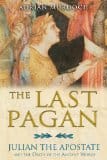
The Last Pagan: Julian the Apostate and the Death of the Ancient World
, by Adrian Murdoch
Inner Traditions, 9781594772269456, 260 pp., 2008
Who was the last pagan emperor of Rome? When did he die? What did his contemporaries, and those who lived after him, think of him? These are all very basic questions. And they are ones that Mr. Murdoch (a fellow of the Royal Historical Society) answers in this enlightening and, more importantly, easily readable book. This is history told as biography, and relies less on dates and places and more on perceptions and actions – both those of the subject and those who wrote about him.
Although this is a book written for the general reading public, and not particularly aimed at Pagan readership, it contains a wealth of information concerning Pagan/Christian relations. It also shows a number of concerns expressed by Julian that are still valid today. As an example, on page 141 Julian is quoted as saying (in a letter to a pagan priest) “It is disgraceful that when no Jew has to beg and the impious Galileans support not only their own poor but ours as well, all men will see that our people lack aid from us.”
The author points out that Julian’s attempt to reinstate paganism as the state religion of the Roman Empire was an uphill battle – the priesthood had been decimated and fallen into a state of decline. No attempt had been made to set an example of proper behaviour by the priesthood. And, by the very fact that Christianity stressed its exclusivity, it was far more unified than the multitude of pagan faiths. We need to remember that at that time, as now, there was not one “pagan” religion. There were various cults to manifold deities, but no one council or authority to settle disputes or organize a common response to a situation. To add to the problems, a follower of Christ could be found in any nation on earth, whereas most pagan religions were nationalistic or, at most, cultural in their basis and orientation. You would not find a native of Mesopotamia worshipping Jupiter, nor a Roman citizen worshipping Marduk.
To his credit, Julian forbade the use of violence against followers of Christ. He marginalized them, excluded them from teaching certain subjects, and ordered restitution for the destruction of pagan temples and shrines, but did not allow violence against anyone because of religious differences.
His reign was cut short (around 2 years) by his death in battle against the Persians. The circumstances have never been clear regarding that event.
How the world would have been different if Julian had lived long enough to make his changes more permanent we will never know. His reign was marked by tolerance (in general) and could have inspired a more tolerant attitude among all his subjects.
This is an excellent book, and I highly recommend it to everyone.








